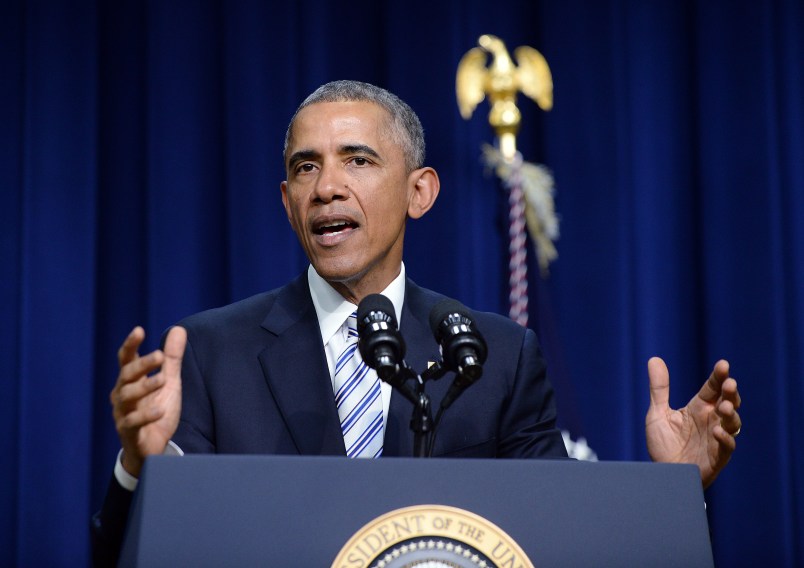President Obama’s proposal to fight ISIS on battlegrounds beyond Iraq and Syria seems to be going nowhere. But given his effort, it is a good time to recall the expensive price tag that accompanied the U.S. war in Iraq: $1.7 trillion dollars, with additional billions owed for war veterans’ benefits. Billions of that went toward “Democratic nation-building,” such as a $750 million dollar U.S. Embassy building in Baghdad; $500 million for an Iraq police training program; and $17.1 million toward fostering political competition in Iraq in 2011, though there were “no results reported,” according to United States Agency of International Development.
It’s easy to play “shoulda, woulda, coulda” with past spending, but here’s an idea: We should require the U.S. government to spend as much money on democratic nation-building at home as it does abroad. Of course, current budgeting practices make it difficult to determine exactly what counts as democratic nation-building. Money spent on infrastructure, such as water plants and roads, can arguably foster the economic conditions necessary for promoting democracy. Other expenditures are more directly associated with democratic institutions, like programs that train judges or increase public participation. In its most recent budget proposal, USAID requested $2.4 billion dollars for democracy and governance programs for Fiscal Year 2016.
If we had a democratic nation-building matching fund, in which we had to match dollar for dollar money spent on democracy abroad with money spent at home, here are my top three budget proposals:
- Match the 3.4 billion dollars the Department of Defense and State department spent for police assistance abroad with 3.4 billion dollars in training and adequately funding the United State’s police. While it is true that police departments are increasingly getting military equipment from the Department of Defense, I would prefer spending that money on conflict resolution training or even a tracking system for determining how many Americans are shot and killed by law enforcement.
- Match the 16.8 million dollars that the U.S. provided to Iraq to train 23,661 people about their legal rights, entitlements, and remedies for vulnerable citizens in 2013 with funding for overstaffed and underfunded public defenders. Public defense caseloads frequently far exceed national standards. The lack of public defenders is one reason that as many as 90 percent of all criminal cases are resolved through plea bargains. U.S. citizens have a right to a lawyer and trial by peers that they are not often able to exercise because of lack of funding.
- Match the 10.7 million dollars the U.S. spent fostering political competition and consensus in Iraq (to ensure 16,835 voters had information they needed to participate and to train 35 election officials) or the approximately $51 million the U.S. spent in Nigeria to support the conduct of credible and peaceful elections in 2015 with money to offset the costs for redistricting. In Wisconsin, the legal costs for redrawing the electoral districts exceed $2 million. (The need for more competitive districts should be self-evident given that in 2012, for example, 90 percent of House incumbents and 91 percent of Senate incumbents who sought re-election were successful). Perhaps less controversially, we could use this money to buy new voting technology.
To be sure, the United States owes the Iraqi people a debt for the destruction of the infrastructure caused by the war as well as the political upheaval resulting from the overthrow of Saddam Hussein. I am not arguing that we should stop trying to promote democracy abroad. Investing in infrastructure and promoting liberal democratic forms of governance, e.g. competitive elections and civil liberties, can advance U.S. foreign policy objectives in democracy promotion.
However, a better way to promote democracy abroad might be to become a better democracy at home. Matching our democracy promotion budget is small compared to matching our defense spending writ large. Personally, I would have preferred spending $6.5 billion for an affordable broadband-enabled Smart Grid to all Americans. Or maybe spend 1.2 trillion dollars for forgiving almost all U.S. student college debt. Or restoring the U.S. infrastructure to a first-world level (The Society of Civil Engineers set the pricetag of such renovations at $1.7 trillion.)
In any case, being a living, breathing example of a democracy that supports due process, reduces police brutality, provides a good and affordable education to its citizens, and economically thrives with cutting-edge technology would make other political regimes want to imitate our democracy. A matching funds program for U.S. democratic nation-building would be a small price to pay in the long run.
Suzanne Dovi is an Associate Professor at the School of Government and Public Policy at the University of Arizona. She is author of The Good Representative. She is currently a Public Voices Fellow with The OpEd Project.







HeadlineFix:
jw1
The $1.2 Trillion Trap: What America Gave Up For 10 Years Of War Since 9/11
The total costs of the wars have gone up since.
Related:The $2.5 Trillion Tragedy: What America Has Given Up For 10 Years Of Bush Tax Cuts
I’m a big fan of NASA. We could have put a dozen rovers on a dozen planets/moons/asteroids each and still had 80% of the 9/11 wars appropriations. A smarter strategy (like our current coalition + local forces method) would have kept us from costly occupations. The Bush Tax Cuts are about 2/3 the cost of fixing a generation of infrastructure neglect (3.6T by 2020). Unlike tax cuts, the infrastructure spending would have paid for itself:
https://www.economy.com/dismal/graphs/blog/MZ_110211_1t.gif
This is the lost opportunity from uncontested GOP rule from 2000-2007.
If only.
But the right wing would criticize it as big government interference, or picking winners and losers
They always do. When dems proved them wrong 80 years ago, they had to make it from the wilderness for a couple generations.
And of course, most of that money went to American contractors with ties to Congress. More redistribution from the bottom to the top.